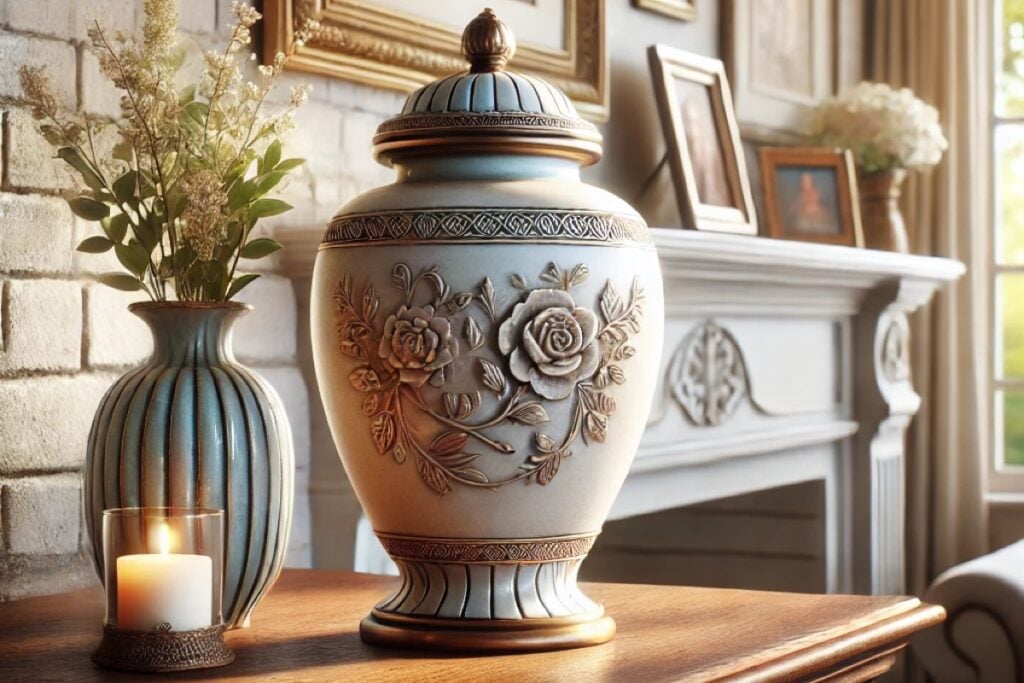When a loved one is cremated or aquamated, families often consider keeping their ashes at home as a personal way to honor their memory. This choice can involve questions about legality, religious views, and practical considerations.
Below, we explore the legalities in the United States, Canada, the United Kingdom, and Australia, as well as religious perspectives, emotional considerations, and best practices.
See also: Do ashes decompose?
Legalities of Keeping Ashes at Home
Here’s what the US, Canada, UK and Australia law says about keeping ashes at home:
United States
There are no federal laws in the United States prohibiting the storage of ashes at home. Cremated remains are considered personal property, allowing families to keep them without restriction. However, local laws may apply if ashes are later moved or scattered, so it’s wise to consult state or municipal guidelines.
Canada
Canadian provinces and territories regulate cremation practices, but most allow families to store ashes at home. For example, Quebec permits home storage under its Funeral Operations Act, provided the ashes are handled respectfully. British Columbia and Ontario also have no specific prohibitions against keeping ashes at home.
United Kingdom
The UK has no specific laws preventing individuals from keeping ashes at home. The person in possession of the Certificate of Cremation typically holds the rights to decide where the ashes are stored, whether at home or in another location.
Australia
Australian laws are similarly permissive, treating cremated remains as personal property. Families can store ashes at home without legal barriers, but if ashes are to be scattered or transported, local council regulations may apply.
Religious Perspectives on Keeping Ashes at Home
Here are what various religions say about keeping ashes at home.
Christianity
- Catholicism: The Catholic Church prefers ashes to be buried or interred in sacred ground, such as a cemetery or columbarium, and discourages home storage.
- Protestantism: Most Protestant denominations leave the decision to individual families, with no specific prohibitions against keeping ashes at home.
Islam
Cremation is forbidden in Islam, and burial of the body is required. Therefore, the question of storing ashes at home does not arise.
Judaism
Traditional Jewish law forbids cremation. For those who opt for it, burial of the ashes is the preferred practice rather than keeping them at home.
Hinduism
Hindus typically scatter ashes in sacred rivers, such as the Ganges, as part of traditional death rites, rather than storing them at home.
Buddhism
Buddhist practices vary, but keeping ashes at home temporarily before enshrining them in a temple or scattering them in a meaningful location is not uncommon.
Sikhism
Sikhs traditionally scatter ashes in rivers or other natural settings and do not encourage long-term home storage.
Other Faiths and Beliefs
- Shintoism: Ashes are often stored temporarily at home before being interred in family graves or altars.
- Modern Paganism: Practices include keeping ashes in personal altars or creating nature-based memorials.
- Indigenous Practices: Indigenous traditions often focus on returning ashes to the earth in a sacred or culturally significant way.
Emotional Considerations When Keeping Ashes
Storing ashes at home can be emotionally significant, offering comfort and a sense of connection. However, families should consider the following:
- Healing and Grief
Having ashes nearby may help some people process grief, but for others, it might prolong emotional distress or prevent closure. - Family Dynamics
Differences in opinion about where ashes should be kept or how they should be handled can cause tension. Discussing and planning as a family can minimize disagreements. - Long-Term Implications
Storing ashes at home is often an interim choice. Families may later decide to scatter, inter, or transfer them. It’s important to consider these possibilities and plan accordingly.
Secular Trends
For non-religious families, keeping ashes has become increasingly common, with trends such as:
- Personalization
Families often choose decorative urns, custom keepsakes, or even art infused with ashes to create a unique memorial. - Eco-Friendly Practices
Biodegradable urns are popular for those who eventually plan to scatter ashes while keeping them at home temporarily. - Dedicated Memorial Spaces
Many families create small altars or memorial areas at home to honor their loved one, combining ashes with photos and mementos. - Temporary Storage
Storing ashes at home while deciding on a final resting place is common, particularly for those awaiting meaningful scattering ceremonies.
Best Practices
If you choose to keep ashes at home, follow these best practices to ensure they are preserved respectfully and safely:
- Select a Suitable Urn or Container
Use an airtight, durable urn made of materials like ceramic, metal, or stone to protect the ashes from damage. - Choose a Respectful Location
Place the urn in a clean, elevated area that is safe from pets, children, and accidental damage. - Label Clearly
Ensure the urn is labeled with the deceased’s name and relevant details, especially if ashes may later be divided or moved. - Plan for the Future
Consider what will happen to the ashes if you move or if future generations inherit them. Discuss these plans with family members. - Understand Local Regulations
If you plan to scatter or transport ashes in the future, research local rules and obtain any necessary permits.

